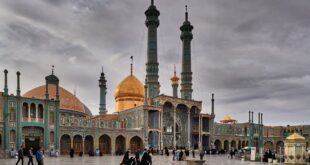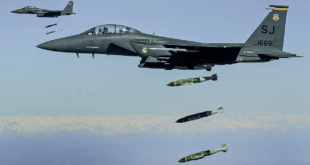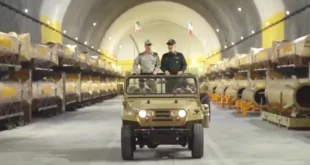VIENNA (AFP) — UN nuclear watchdog chief Mohammed Al Baradei may be carrying a message from the Iranians on his visit to Washington this week amidst the crisis over Tehran’s atomic ambitions, diplomats told AFP.
Diplomats said Baradei could play a role in secret diplomacy as he met in Vienna only last week with chief Iranian nuclear negotiator Ali Larijani, but they were pessimistic about a breakthrough.
Baradei left Monday from the Vienna headquarters of his International Atomic Energy Agency (IAEA) for Washington where he was expected to meet US Secretary of State Condoleezza Rice on Tuesday or Wednesday.
The visit comes at a time of deadlock in the standoff over Iran’s nuclear power programme, which the United States claims hides the secret development of atomic weapons.
Iran insists its uranium enrichment is not up for negotiation, rejecting European Union efforts to secure a halt to this sensitive nuclear work that makes fuel for civilian reactors but also atom bomb material.
One Western dipomat said: “Baradei may indeed have a message from Larijani but the Americans doubt that it will say anything useful.”
A European diplomat said: “What is interesting in not what Baradei’s views are. What is more interesting is what he may be carrying with him from Larijani.” A third diplomat, who like the others did not want to be identified, said: “The Iranians want to talk but they don’t want to be seen as negotiating under pressure.” The diplomat said: “Baradei is saying, give the Iranians a generous offer. Give them nuclear technology. Be generous,” in order to secure guarantees Iran will not make nuclear weapons.
But the European diplomat said Baradei would be arriving in Washington “too late to influence anything” as EU negotiators Britain, France and Germany are to meet in London Wednesday with China, Russia and the United States to finalize their latest proposal.
The European trio is urging world powers to help Iran’s nuclear and other industries if Tehran stops enriching uranium, but wants Russia and China to join in sanctions, including an arms embargo, if Iran does not do so, according to a copy of a draft proposal seen by AFP.
The European diplomat added that since the Iranians “are certainly insisting on some sort of enrichment, at least research, it’s difficult to see how this is going to end on a positive note.” “Baradei’s positions are well known.
He thinks the United States should get involved in talks with Iran and that the nuclear issue can only be settled in an overall security framework which gives nations guarantees so that they do not think they need atomic weapons,” the diplomat said. The United States is seen as key to convincing Iran that it would receive valid trade, technology and security benefits in return for guarantees.
But Washington rejects both talking directly to Tehran and giving security guarantees to the Islamic Republic, especially with Iranian President Mahmoud Ahmadinejad calling for the destruction of Israel.
A diplomat in Vienna close to the Iranians told AFP that Tehran would be willing to strike a compromise as long as it could keep small-scale enrichment work, namely the enriching of uranium already being done by a 164-cascade of centrifuge machines it has had since the beginning of the year.
The Iranians are seeking to move towards industrial-level enrichment with more than 50,000 centrifuges. This could make enough enriched uranium for an atomic bomb within a short timeframe, while a 164-centrifuge cascade is not believed to be a proliferation risk.
Â
Minister denies human bird flu cases
GENEVA (Reuters) — Iran’s health minister on Tuesday denied that tests on two dead pneumonia patients had shown they had the deadly H5N1 bird flu virus and insisted the results were negative.
Health Minister Kamran Lankarani told Reuters on the sidelines of the annual meeting of the World Health Organisation (WHO) in Geneva: “Fortunately, these two cases were negative for avian flu. There is no confirmed case till now.” On Monday, an Iranian medical official in the country said tests on the bodies of a brother and sister who died after falling ill with pneumonia-like symptoms in the northwestern city of Kermanshah showed they had the deadly H5N1 strain.
Samples have been sent to international laboratories for further tests, and if the initial results are confirmed, these would be the first human bird flu deaths in Iran. But in Cairo, the WHO’s regional adviser for emerging diseases, Hassan Al Bushra, said the agency had also been told that the results in Iran were negative for bird flu.
“The (Iranian) director general for centre of disease control, ministry of health and medical education has verbally informed the WHO office in Iran that there have been no H5N1 positive human cases reported so far,” he said.
He said so far WHO’s regional office had not received any samples from Iran for testing.
The virus has killed people in neighbouring Turkey, Iraq and Azerbaijan in recent months, while Afghanistan has had outbreaks in poultry. Iran found the virus in wild swans in February.
The Iranian siblings, a brother aged 41 and sister, 26, were among five family members who fell ill.
“They had all returned from a trip to the town of Marivan when they fell ill with symptoms of staphylococcal pneumonia,” an Iranian medical official told Reuters in Tehran, adding that the brother and sister had tested positive locally for H5N1. Lankarani said Iran had tightened its surveillance since cases were detected in neighbouring states.
“This was alarming and a signal to us, so we strengthened surveillance,” he said.
 Eurasia Press & News
Eurasia Press & News



